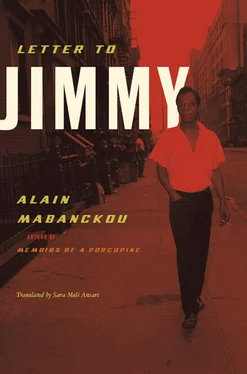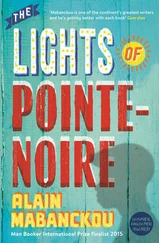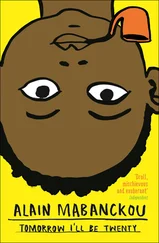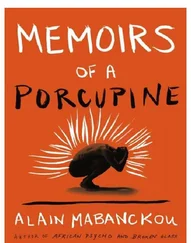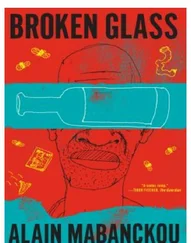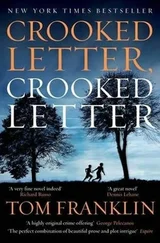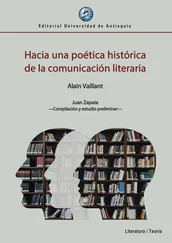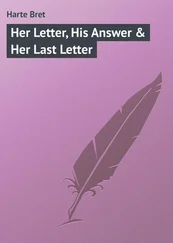Wright criticizes the American army head on, condemning their racism against blacks. He refuses to serve during the war because, as he underscores in a letter to one of his friends, “they ask us to die for a freedom that we have never known.” One of Wright’s biographers, Hazel Rowley, tells of how, in 1947, the writer distances himself from America, as do most of his black counterparts. Wright is encouraged by Jean-Paul Sartre, Simone de Beauvoir, Claude Lévi-Strauss, and, in the end, settles in the City of Light with his wife — a Jewish American woman. 37
It would be an understatement to say that your admiration for Wright’s journey knows no bounds. You have read and re-read Native Son to the point that is serves as inspiration for the title of your collection of essays, Notes of a Native Son. You dream of being like him because he had overcome the prevailing fatalism of his surroundings: “I had identified with him long before we met: [. .] his example had helped me to survive. He was black, he was young, he had come out of the Mississippi nightmare and the Chicago slums, and he was a writer. He proved it could be done — proved it to me and gave me an arm against all those others who assured me it could not be done.” 38
You want to meet him, talk with him; learn from your elder the meaning behind the effort, the discipline, and the demands of writing. And, while you are at it, how to achieve the same success.
Around this time, you knock on the door to his house in Brooklyn. The writer welcomes you with open arms, much to your great surprise, you who expected to find yourself face to face with an emotionally distant author, walled off by his fame. You are impressed, intimidated. He puts you at ease. And while you are enjoying some bourbon, you announce, in the euphoria of the conversation, that you have written fifty or sixty pages, a novel entitled In My Father’s House— which will become Go Tell It On the Mountain. You cannot gauge the level of excitement you have just stirred up in the mentor. He encourages you, and expresses a desire to read the pages that you had not brought with you. Do they exist, or had you made them up?
Leeming reports: “After a few days of furious writing, Baldwin sent the sixty pages to Brooklyn. Within a week Wright had read the manuscript, reacted positively to it, and, by way of Edward Aswell, his editor at Harper & Brothers, had recommended Baldwin for a Eugene F. Saxton Foundation Fellowship. .” 39
In 1945, you receive the fellowship of five hundred dollars in order to finish the book. It is a major step forward. And because the same prestigious Harper publishing house that publishes Wright supplies the funds, he speaks of you to his editor. A reading panel reviews your work. It is judged to be unpublishable, and, in the end, rejected both by that publisher and by Doubleday: “. . when I was about twenty-one I had enough done of a novel to get a Saxton Fellowship. When I was twenty-two the fellowship was over, the novel turned out to be unsalable, and I started waiting on tables in a Village restaurant. .” 40
It is of course a painful disappointment, but you do not give up trying to emulate your mentor. You ask yourself what, in the end, makes Native Son have such a profound effect? Is it the shock of a white woman’s murder by a black man?
You begin writing a new work, Ignorant Armies, which, as in Wright’s book, tells a tale of murder with the issue of race at the heart of it: Wayne Lonergan, a bisexual, kills his rich wife for reasons related to their sexual problems. The voice of the narrative is unclear: although the story does gather its strength and truth from your life in Greenwich Village, marked by the “problem” of a sexuality that was more and more turned toward men, you speak in the place of your characters. What is more, this book contained two novels in one! The proof? Out of this “rough draft,” two of your most well-known works of fiction would emerge: Giovanni’s Room and Another Country, two novels that portray sexuality, even homosexuality, in the most tragic light. 41
Following in your mentor’s footsteps is not your only source of inspiration for the “failure,” Ignorant Armies. Your own existence prior to your arrival in France is its own series of tragedies. As James Campbell relates to us about your life: “His father, crippled with madness, had died in a psychiatric ward. Baldwin had lost his Christian faith, which had plunged him deep into crisis, and helped him, one could say, accept the awakenings of his homosexuality — something very little accepted in Harlem, where he lived, and accepted even less in Church, where he had been preaching as a young minister.” 42
•••
In New York you continue all the while to have meetings with your mentor. He takes off for Paris in 1946.
France will be the stage for your confrontation. Wright is as yet unaware that the pupil who had knocked on his front door had grown up, and, to survive, would need to trace his own path. Everything can perhaps be summed up with terrifying clarity in the following words: “His work was a road-block in my road, the sphinx, really, whose riddles I had to answer before I could become myself. [. .] Richard was hurt because I had not given him credit for any human feelings or failings. And indeed I had not, he had never really been a human being for me, he had been an idol. And idols are created in order to be destroyed.” 43
4. the destruction of idols: from Uncle Tom’s Cabin to Native Son
In 1948 your friends George Salamos and Hasa Benveniste, also living in France, prepare to launch the journal Zero and call upon you to submit an article. The directors of Zero do not suspect that the text you will submit will ring in the era of hostilities between you and Wright.
The title itself has an agenda: “Everybody’s Protest Novel” (translated into French as “Une opposition complice”). 44The article is simultaneously published in the Partisan Review .
The article begins by attacking works of fiction of the time, which, in your opinion, favor moral stories over art. In the “protest novel,” as you call it, the author is indignant and cries out against what is supposed to be an abomination: slavery, racism, and general injustice. You think that this outrage is insincere, nothing more than a showing off of emotions. And it is a known fact that good literature cannot be created on good intentions alone. A very famous novel will serve as your primary target: Uncle Tom’s Cabin. In your childhood, you read this book several times. It moved you, touched you.
First published in 1851, the novel takes place in antebellum America. Mr. Selby, a prosperous plantation owner somewhere in Kentucky, prides himself in treating his slaves with a certain degree of charity. Alas, drowning in debt, Mr. and Mrs. Selby must resign themselves to selling two of their slaves: Tom, the “good” old slave, and a child, Harry. Upon meeting Uncle Tom, the young Evangeline St. Clare is touched by the goodness of this man of color, and begs her father to buy him. Is this the end of the tender-hearted slave’s peregrinations? Already weary, he must endure another separation. The novel follows his odyssey with a blend of emotion, sentimentality, and, above all, a clear conscience.
You no longer look at this book in the same light as you did in your childhood. From this point on you consider it to be a “very bad novel,” which you criticize for its “dishonesty,” “sentimentality,” and its “inability to feel.” 45 Uncle Tom’s Cabin , in your opinion the crown jewel of protest novels, nevertheless inspired other noteworthy writers, especially several of your African-American colleagues, as Amanda Claybaugh confirms: “. . many African-American authors from the first part of the 20th century were tempted, at a certain point in their career, to rewrite Uncle Tom’s Cabin .” 46
Читать дальше
